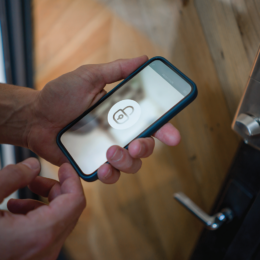By Patrick Keegan and Amy Wheeless

Currently available LED bulbs give off the same light as incandescents, while using one-sixth as much energy and lasting 25 times as long.
I am considering installing solar, and a neighbor asked if I was going to have a “Zero Net Energy” Home. Can you explain what that is?
A Zero Net Energy (ZNE), or Net-Zero, Home is one where all of the energy that is used in the home is completely offset by the production of on-site power, such as through rooftop solar photovoltaic panels.
Having a ZNE Home does not mean that you are “off-grid” — your home still uses electricity from your electric co-op for daily needs, especially when the sun isn’t shining. A ZNE Home also means you can supply power back to the electric grid from your solar panels. If you are considering rooftop solar panels for your home, you should talk to your electric co-op first.
Usually, the term ZNE Home describes a newly built home, as it is easier to custom-build an energy efficient home and properly size solar panels that will match the expected energy use. Check with your co-op, too, about the Indiana Touchstone Energy Home Program, especially if you’re planning to build. Existing homes can also be retrofitted to be ZNE. But before you go out and buy a solar panel system that will cover every inch of your roof, remember this mantra: “Reduce before you produce.”
Efficiency options like heat pumps and increased insulation may not seem as exciting as solar panels, but they can produce a better return on your investment. Before you purchase and install solar panels, make all the cost-effective energy efficiency improvements you can. You will likely be able to reduce the number of solar panels you need, while also seeing sustained energy savings over time.
An energy audit is the first step to learning how to make your home as efficient as possible. An energy auditor will walk through your home and perform tests to find out where air is leaking. An energy auditor can also perform energy modeling to tell you how much energy you would save by implementing certain improvements. If you are interested in an energy audit, talk with your electric co-op. It may offer an audit or have names of trusted energy auditors.
Retrofitting a home to be ZNE will likely require investments — large and small. Upgrading your HVAC system to something more efficient is a large investment, but, as heating and cooling usually makes up half of the average home’s energy use, the upgrade will have a substantial impact on your home, especially when combined with insulation improvements. Sealing up air leaks and replacing lightbulbs with LEDs are smaller investments but can also help you reach ZNE. Behavioral changes, such as turning down the heat when you leave for the day, using your solar clothes dryer (a clothes line!) and turning off electronics and lights when you leave a room are also small and easy ways to reduce your energy use.
Once you have reduced your energy use as much as you can, you can now think about producing. Solar photovoltaic panels are the most common residential renewable energy installation, though a small wind energy system could be a good choice if your home is on one of the rare sites that is windy enough.
There are also other ways to harness the power of the sun. For example, solar water heaters can be cost-effective. Or you can use passive solar techniques, like strategic window placement, landscaping and shading, and specific building materials to heat certain areas of your home in the winter or reduce sun and heat exposure in the summer.
You may be able to reduce your energy impact without purchasing your own rooftop solar panels. Many electric co-ops are beginning to offer community solar programs, or “solar gardens,” where co-op members invest in part of a larger solar installation that supplies the co-op’s electric grid. Participating in a community solar program gives you the benefit of solar power without needing to install and maintain your own solar panels.
Remember to talk with your electric co-ops’ energy experts before making any major upgrades, like rooftop solar, to your home.
Patrick Keegan writes on consumer and cooperative affairs for the National Rural Electric Cooperative Association, service arm of the nation’s 900-plus consumer-owned, not-for-profit electric cooperatives based in Arlington, Virginia. Amy Wheeless writes for Collaborative Efficiency. For more information, visit: www.collaborativeefficiency.com/energytips or email Pat Keegan at energytips@collaborativeefficiency.com.



